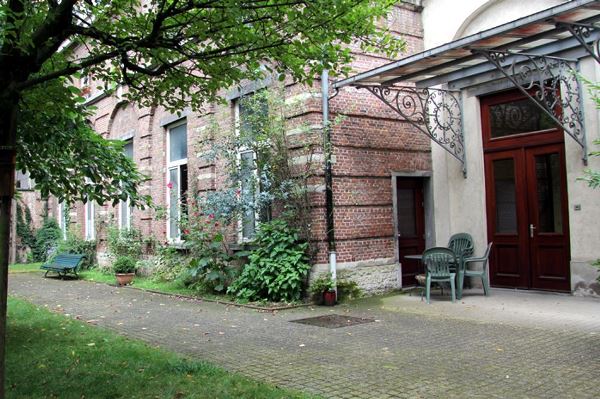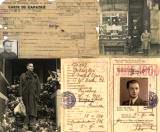New videos (only partially in English)
Table of contents of issue no. 120 (Dutch/English)
Table of contents and abstracts (French/English)
Editorial: Un supplément d'âme (Philippe Mesnard)
Agenda
Logbook
- Paths of Glory (Gabriel Raichman)
- Der Anständige Heinrich Himmler (interview with Vanessa Lapa)
- Shell Shock. A Requiem of War (Daniel Weyssow)
- Vasily Petrenko fulmineert in de 13e symfonie van Sjostakovitsj [Vasily Petrenko fulminates in Shostakovitch’s Symphony No. 13] (Jean-Luc Caron)
- Collection ‘Les Musiciens et la Grande Guerre’ (Jean-Christophe Le Toquin)
- The ARC Ensemble committed to Remembering the Forgotten (interview with Simon Wynberg)
- Presentation: 100 Years Later… A memory laboratory between Armenians and Turks?
- On memory, identity, and genocide (Uğur Ümit Üngör)
- Remembering the Armenian genocide in contemporary Turkey (Seyhan Bayraktar)
- Een nieuwe golf [A new wave] (interview with Sila Cehreli)
- Het Armeense bewustzijn in het Duits-Turkse discours [Armenian consciousness in the German-Turkish discourse] (Michael Hofmann)
- Geheugen, weefsels en de esthetiek van de verplaatsing [On memory, textures and the aesthetics of displacement] (Marie-Aude Baronian)
- Kinships Past, Kinship’s Futures (David Kazanjian)
- Concise chronology
- Selected bibliography
- Van ‘ondervonden’ genocide naar bevestigde etnocide. De Amerikaanse indianen en de grenzen van definities [From ‘experienced’ genocide to confirmed ethnocide. The American Indians and the limits of definitions] (Anne Garrait-Bourrier)
- Rechtstreeks getuigen en getuigen aan de hand van sporen: Sarah Kofman, Hélène Berr en Dora Bruder in Parijs onder de Duitse bezetting [Direct witnessing and witnessing traces: Sarah Kofman, Hélène Berr and Dora Bruder in Paris during the German occupation] (Désirée Schyns)
- Beyond Memory: Italy and the Holocaust (interview with Robert Gordon)
- The (self?)liberation of the Buchenwald concentration camp prisoners as viewed by German historians (Jean-Louis Rouhart)
- Communicative memory (Clotilde Coueille)
- Passio Perpetuae et Felicitatis (Marco Formisano)
- Perpetrator images (Vicente Biosca)
- Survivance (Janine Altounian)
- The apostle Thomas, called “the doubting Thomas” (Aurélia Kalisky)
- Tourism and memory (Jessica Rapson)
- Transnational memory (Ann Rigney)
- Memorial site: Kommunarka (Luba Jurgenson)
Portfolio: A Beech Forest
Interview: Herman Van Goethem (Kazerne Dossin), “Clearly, this museum constitutes a work of collective memory”
Dossier: What future is there for the memory of the Armenian genocide?
Under the direction of Philippe Mesnard
Readings
Dictionary
- Rwanda (IV): Naamgeschiedenis: De functie van de antroponymie [Tracing history through names: the role of anthroponymy] (Rémi Korman)
- België (II): Over fictie en waarheid, beeld en verbeelding in de hedendaagse roman over de Eerste Wereldoorlog [Fiction and truth, image and imagination in contemporary novels on the First World War] (Kris Peeters and Myrthel Van Etterbeeck)
- Britta Schilling, Postcolonial Germany: Memories of empire in a decolonized nation (Caterina Romeo)
- Cristina Lombardi-Diop & Caterina Romeo (eds.), Postcolonial Italy: Challenging national homogeneity (Britta Schilling)
- Henk van der Werf, Totalitaire ontsporing: Een analyse van de beschaving in de waancultuur van het Derde Rijk (Fabian Van Samang)
- Hans Citroen & Barbara Starzyńska, Auschwitz-Oświęcim, Oświęcim-Auschwitz and Hans Citroen, Auschwitz – De Judenrampe, vergeten spoor (Christophe Busch)
- Michael Wildt & Katrin Himmler, Heinrich Himmler, d’après sa correspondance avec sa femme, 1927-1945 (Colette Gutman)
- David M. K. Sheinin, Consent of the damned: Ordinary Argentinians in the dirty war and Sebastián Carassai, The Argentine silent majority: Middle classes, politics, violence, and memory in the seventies (Paul Katz)
- Bert Ingelaere, Stephan Parmentier, Jacques Haers & Barbara Segaert (eds.), Genocide, risk and resilience: An interdisciplinary approach (Susan Thomson)
- Laure Marchand & Guillaume Perrier, La Turquie et le fantôme arménien (Jean-Pierre Pisetta)
- Pierre Schoentjes, Fictions de la Grande Guerre. Variations littéraires sur 14-18 (Aurélia Kalisky)
- Jennifer Hansen-Glucklich, Holocaust memory reframed: Museums and the challenges of representation (Sayma Khan)
Memory laboratory
Bookshelf
The latest
Some of our projects
Contact
Auschwitz Foundation – Remembrance of Auschwitz
Rue aux Laines 17 box 50 – B-1000 Brussels +32 (0)2 512 79 98
+32 (0)2 512 79 98 info@auschwitz.be
info@auschwitz.be
BCE/KBO Auschwitz Foundation: 0876787354
BCE/KBO Remembrance of Auschwitz: 0420667323
Office open from Monday to Friday 9:30am to 4:30pm.
Visit only by appointment.
![]()
![]()
![]()
![]()
![]()
Become a member
To become a member of Remembrance of Auschwitz ASBL, please contact us and transfer the sum of €50.00 to our account IBAN: BE55 3100 7805 1744 – BIC: BBRUBEBB with the communication: ‘Membership fee 2025’. The membership includes two issues of 2025 of our scientific journal.
DONATIONS
Donations of €40.00 or more (in one or more instalments) qualify for tax exemption for Belgian taxpayers.
In communication, please specify that it is a ‘Donation’ and mention your National Number which is required since 2024 to benefit from the tax exemption.
Subscribe
Error : Please select some lists in your AcyMailing module configuration for the field "Automatically subscribe to" and make sure the selected lists are enabled










 The Auschwitz Foundation was founded in 1980 by Paul Halter, an Auschwitz survivor. Replacing the Amicale Belge des Ex-Prisonniers politiques d’Auschwitz-Birkenau Camps et Prisons de Silésie, the primary objective of the Auschwitz Foundation is to study the history and memory of the victims of the Holocaust and the Nazi terror in a sustainable and systematic way. The transmission of memory and the preservation of archives concerning these events complete this goal.
The Auschwitz Foundation was founded in 1980 by Paul Halter, an Auschwitz survivor. Replacing the Amicale Belge des Ex-Prisonniers politiques d’Auschwitz-Birkenau Camps et Prisons de Silésie, the primary objective of the Auschwitz Foundation is to study the history and memory of the victims of the Holocaust and the Nazi terror in a sustainable and systematic way. The transmission of memory and the preservation of archives concerning these events complete this goal.





